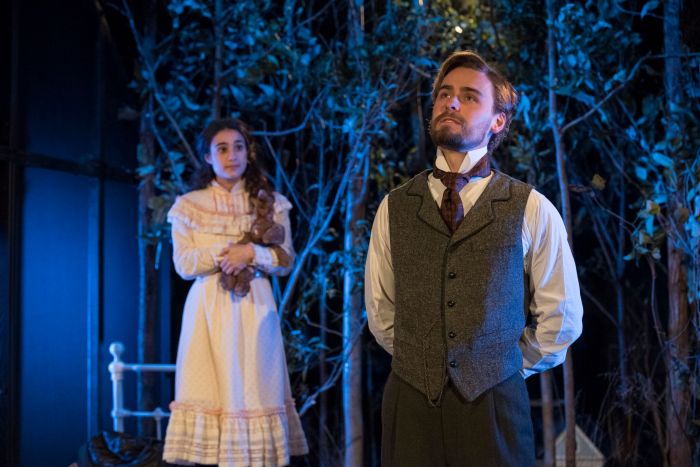Set in a world that seems even less far away in 2017 than in 2012, people are living out their daily lives in virtual offices, in virtual schools and strolling in virtual gardens. The Nether, an extension of the Internet, offering total sensory immersion, also offers abundant business opportunities for making personal dreams a reality. The central character, Mr Sims (a splendid Kim Knuckey), is one such opportunistic businessman, whose site, The Hideaway, has its origin in the satisfaction of his own sexual preference for young girls.
The play opens with the prosperous, self-congratulatory Sims being interrogated by Detective Morris (a strong Katie Fitchett). His “realm” has been deemed “impermissible” by community standards and Morris is charged with the task of getting Sims to reveal the location of his servers. Sims is very sure of his ground, arguing that his site benefits the community by allowing men like himself to indulge their desires without “real” harm. We all know the answer to that one, but his next challenge is a more damaging one: does the community have the right to censor personal imagination?
Personal fantasy, however, would be a more accurate description. When we see Sims in The Hideaway where he takes on the identity of “Papa”, we might be appalled by how unimaginative his fantasy world is. A cleverly constructed stage set has the site tucked into cyber space, an enclosed realm whose pleasures can be accessed through a forest leading to a child’s room, warmly coloured by contrast to the sombre surroundings. The room itself, the prepubescent Iris (a convincing Danielle Catanzariti) with boots, flounced dress and velveteen rabbit, and all that happens there between her and Papa, and later Mr Woodnut (a sensitive Alec Snow), Detective Morris’s undercover agent, is imported directly from the suspect Victorian obsession with childhood innocence.
Sims proves a tough opponent, and Morris summons another Hideaway visitor, the troubled Mr Doyle (an impressive Alan Faulkner) to an interrogation. Disappointed in life, Doyle has become a “shade”, that is, one who lives almost entirely on-line, and he now wishes to “cross over” permanently into The Hideaway. His reflected image on many suspended monitors bears out the comment: “who are we if we act without consequence?” And who are we, if we concede, despite the tenderness of the final confessional moment between Doyle and Sims, that the sickening relationship between avatars of consenting adults is an uplifting instance of “the universe wanting to know itself”.
The Nether is a fine production, sensitively and firmly directed, and consequently absorbing despite its unpalatable aspect. The set (designer, Pip Runciman, lighting, Christopher Page) intelligently supports the action, the suspended monitors with repetitive images making the audience long for something more “real”, seducing them as it tempted even the resolute Detective Morris to see The Hideaway as a haven.





